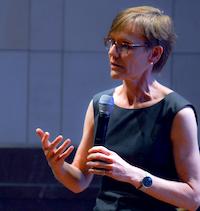
WASHINGTON, DC-- About 250 Duke alumni, faculty and friends gathered Wednesday for the Sanford School of Public Policy’s annual “Sanford on the Hill” event at the Capitol Visitors Center.
Guest speaker Judy Woodruff, anchor and managing editor of PBS NewsHour, discussed current issues in politics and media with Frederick “Fritz” Mayer, professor in the Sanford School and director of POLIS, the Center for Political Leadership, Innovation and Service.
Woodruff, a Duke alumna, has more than 40 years of media experience covering six presidents, tough political campaigns and rancorous debates. America is experiencing something she has never seen before, she said. President Trump is delivering on his promise to be a disruptor.
“I have never seen us as split and angry as we are today, and it is not just in Washington, but around the country.”
Woodruff said she is particularly concerned by the apparent politicization of the U.S. Supreme Court. She noted when the late Justice Antonin Scalia, a Ronald Reagan nominee, was confirmed in 1986, the Senate vote was unanimous, a result impossible to imagine today.
About Judy Woodruff
Judy Woodruff has covered politics and other news for more than four decades at NBC, CNN and PBS. She currently serves as anchor and managing editor of the PBS NewsHour. She is a founding co-chair of the International Women’s Media Foundation, an organization dedicated to promoting and encouraging women in journalism and communication industries worldwide. She holds more than 25 honorary degrees. Woodruff spoke with Sanford's Frederick “Fritz” Mayer.
The roots of today’s political divisions go back to the election of Bill Clinton, whom Republicans saw as an “interloper who didn’t deserve to be in the Oval Office,” Woodruff said. Then, the disputed election of 2000 left the presidency in limbo for 38 days until the Supreme Court gave the decision to George W. Bush. Democrats called it a stolen election.
“We have had resentments piled on top of resentments,” she said.
Meanwhile, citizens seeking to understand the issues are “swimming in a sea of news” -- paradoxically having more information than ever before, but much of it being manipulated, Woodruff said.
Her passion, she said, is to help support and preserve news organizations that are truthful and trustworthy.” Healthy media, accurate information and educated citizens are essential to the survival of our democracy, she said,

“It makes me angry when I hear the president say reporters are the enemy of the people.”
Woodruff urged young alumni not to take our democracy for granted.
“We need to work as citizens every day to vote, to be engaged with government, or it will become something we don’t recognize and don’t want.”
Duke University President Vincent Price opened the event by praising the Sanford School and its alumni as “great assets of our university.” The school offers “the best policy education in the United States,” Price said, adding, “as a member of the public policy faculty, I am biased.”

He also spoke of the university’s aspiration to create a “best-in-class Policy Bridge between our academic work and policy officials” in order to “as James B. Duke said, ‘uplift our region and the world.’” The Duke Policy Bridge, launched in 2015 and centered at the Sanford School, connects faculty to policymakers and has convened academics and policymakers around issues including opioid abuse.
Judith Kelley, delivering her first public remarks since becoming dean of the Sanford School on July 1, drew parallels between the fields of public policy education and journalism. Both higher education and media are now experiencing “deep skepticism toward our institutions,” she said, along with persistent questioning of facts and science. Both institutions are being disrupted by evolving funding models and technological advances.
Because it sits between the university and the outside world, the policy school is “well-positioned to lead both on interdisciplinary problem solving, and on placing knowledge in the service of society,” Kelley said. “We can do it, because we have fantastic faculty, smart students, and alums who inspire students on a daily basis.”
Featured Video
